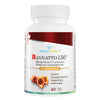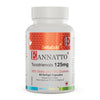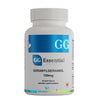Did you know that your gut is home to trillions of bacteria? That's right, trillions! Your gut contains about 100 trillion bacteria, weighing up to 4 pounds in total. These bacteria, known as the gut microbiota, play a vital role in maintaining your overall health and well-being.
When it comes to gut health, what you eat matters. Your diet can directly influence the composition and diversity of your gut microbiome, impacting digestion, immune function, and even mental health. If you're looking to improve your gut health, understanding what foods are good for gut health is essential.
Key Takeaways:
- The gut is home to trillions of bacteria and weighs up to 4 pounds.
- Diet plays a crucial role in maintaining gut health and supporting the gut microbiome.
- Understanding what foods are good for gut health can help optimize digestion and overall well-being.
- Fiber-rich foods and fermented foods are particularly beneficial for gut health.
- Incorporating gut-friendly foods into your diet can support a diverse and balanced gut microbiome.
Understanding the Microbiome: Key to Gut Health
The gut microbiome is a complex ecosystem of microorganisms that reside in our digestive tract. These microorganisms play a vital role in our overall health, influencing everything from digestion to immunity.
To support a healthy gut, it is important to consume foods that promote gut health and nourish the microbiome. Incorporating gut-friendly foods into your diet can help maintain a diverse and balanced microbiome, leading to improved digestion and overall wellness.
So, what foods are good for gut health to include in your diet to support?
Let's take a look at what foods are good for gut health:
Foods that Promote Gut Health:
- Yogurt: This fermented dairy product is rich in probiotics, which are beneficial bacteria that help populate the gut.
- Kefir: Similar to yogurt, kefir is a fermented beverage that contains a variety of probiotic strains, supporting a healthy gut microbiome.
- Sauerkraut: Made from fermented cabbage, sauerkraut is a great source of beneficial bacteria and can help promote a diverse microbiome.
- Kombucha: A fermented tea drink, kombucha contains probiotics that can support gut health and improve digestion.
- Kimchi: A traditional Korean side dish made from fermented vegetables, kimchi is packed with probiotics and other gut-friendly nutrients.
Foods to Support Gut Health:
- Whole Grains: Opt for whole grain options like brown rice, oats, and quinoa, which are high in fiber and can promote regular bowel movements.
- Leafy Greens: Incorporate leafy greens like spinach, kale, and Swiss chard into your diet to increase fiber intake and support a healthy gut.
- Prebiotic Foods: Foods rich in prebiotic fibers, such as garlic, onions, and bananas, act as fuel for beneficial gut bacteria and help them thrive.
- Berries: Enjoy a variety of berries like blueberries, raspberries, and strawberries, which are high in antioxidants and can contribute to a healthy gut.
- Fatty Fish: Include omega-3 fatty acid-rich fish like salmon, mackerel, and sardines in your diet to reduce inflammation and support gut health.
By incorporating these foods that promote gut health and support a diverse microbiome, you can enhance digestion, boost immunity, and improve overall well-being.
Fiber-Rich Foods: The Gut's Best Friend
Fiber is an essential nutrient that plays a crucial role in maintaining gut health. Including fiber-rich foods in your diet can help improve digestion, promote regular bowel movements, and support the growth of beneficial gut bacteria.
When it comes to foods for a healthy gut, fiber should be at the top of your list. Here are some of the top foods for gut health that are rich in fiber:
- Whole grains, such as oats, brown rice, and whole wheat bread
- Legumes, including beans, lentils, and chickpeas
- Fruits and vegetables, especially those with skin and seeds, like apples, berries, and broccoli
- Nuts and seeds, such as almonds, chia seeds, and flaxseeds
Including these fiber-rich foods in your diet can provide numerous benefits for your gut health. Fiber acts as a prebiotic, feeding the beneficial bacteria in your gut and helping them thrive. It also adds bulk to your stool, promoting regular bowel movements and preventing constipation.
Additionally, fiber can help lower cholesterol levels and regulate blood sugar levels, contributing to overall health and well-being.
Make sure to gradually increase your fiber intake to avoid any digestive discomfort. Also, remember to drink plenty of water throughout the day, as fiber absorbs water and helps maintain healthy digestion.
Fermented Foods: Boosting Gut Health with Probiotics
Fermented foods are a hidden treasure when it comes to promoting gut health. These foods contain live bacteria and yeasts that provide numerous benefits to the gut.
By consuming fermented foods, you can introduce probiotics, which are beneficial bacteria, into your digestive system. These probiotics help maintain a healthy balance of gut bacteria, promote optimal digestion, and support overall gut health.
There is a wide range of fermented foods that you can incorporate into your diet to improve your gut health. Let's explore some of the gut-friendly options:
- Yogurt: Yogurt is a classic fermented food that is packed with probiotics. Choose natural or Greek yogurt with live cultures to ensure you're getting the most benefits.
- Sauerkraut: This tangy and crunchy fermented cabbage is rich in probiotics, fiber, and essential nutrients. Include a spoonful of sauerkraut as a healthy side dish or topping.
- Kombucha: Kombucha is a fermented tea that contains probiotics and antioxidants. Enjoy a refreshing glass of kombucha to support your gut health.
- Miso: Miso paste, made from fermented soybeans, adds a savory umami flavor to soups, marinades, and dressings. It is also a good source of probiotics.
- Kimchi: This traditional Korean side dish is made from fermented vegetables like cabbage, radishes, and spices. Kimchi not only provides probiotics but also adds a delicious kick to your meals.
By including these fermented foods in your diet, you can actively improve your gut health and enhance your digestion. Experiment with different flavors and combinations to find what works best for your taste buds. Remember, a diet rich in gut health foods can have a positive impact on your overall well-being.
Conclusion
In conclusion on what foods are good for gut health, incorporating the right foods into your daily meals can have a significant impact on promoting gut health. A well-balanced diet that is rich in fiber and probiotic-rich foods can play a key role in supporting optimal digestion, bolstering your microbiome, and improving overall wellness.
To support a healthy gut, it is important to include foods and understand what foods are good for gut health is crucial such as whole grains, legumes, fruits, and vegetables that are high in fiber. These foods help promote regular bowel movements and provide nourishment for the beneficial bacteria in your gut, contributing to a healthier digestive system.
Additionally, consuming fermented foods like yogurt, sauerkraut, and kimchi can introduce beneficial probiotics into your gut, supporting a diverse and balanced microbiome.
By prioritizing your gut health and making mindful food choices, you can take charge of your digestive well-being. Incorporating gut-friendly foods into your diet, such as those mentioned above, can help you achieve a healthy gut and improve your overall quality of life.
Remember, what you eat plays a vital role in supporting your digestive system, so make sure to understand what foods are good for gut health and choose the best foods for gut health.
FAQs
What role does gut health play in overall wellness?
Gut health plays a vital role in overall wellness as it affects digestion, nutrient absorption, immune function, and even mental health. A healthy gut is essential for maintaining a strong and resilient body.
What foods are good for gut health?
Foods rich in fiber, such as fruits, vegetables, whole grains, and legumes, are excellent for promoting gut health. Additionally, fermented foods like yogurt, sauerkraut, kefir, and kimchi contain beneficial probiotics that support a healthy gut microbiome.
How can improving gut health through diet?
You can improve your gut health through diet by incorporating more high-fiber foods into your meals. Opt for whole grains, leafy greens, and a variety of fruits and vegetables. Additionally, including fermented foods in your diet and staying hydrated can also promote a healthy gut.
What are the top foods for gut health?
Some of the top foods for gut health include oats, bananas, berries, broccoli, lentils, almonds, yogurt, sauerkraut, and kombucha. These foods are rich in fiber, prebiotics, and probiotics, all of which support a thriving gut microbiome.
Are there any gut-friendly foods I should avoid?
While everyone's tolerance to certain foods may vary, it's generally advised to limit the consumption of processed foods, sugary snacks, and fatty foods. These can potentially contribute to inflammation and disrupt the balance of gut bacteria.
How long does it take to see improvements in gut health through diet?
The timeline for seeing improvements in gut health through diet varies from person to person. It can take weeks or even months to notice significant changes. Consistency is key, so it's important to maintain a healthy diet and lifestyle over the long term.
Can gut health impact mental health?
Yes, there is a strong connection between gut health and mental health. The gut and brain communicate through the gut-brain axis, and imbalances in the gut microbiome can impact mood, cognition, and overall mental well-being. Taking care of your gut can have a positive impact on your mental health.
Can probiotic supplements help improve gut health?
Probiotic supplements can be beneficial for some individuals, especially those who have specific gut health concerns or have taken antibiotics. However, it's always best to consult with a healthcare professional before starting any supplements to determine the best approach for your situation.











